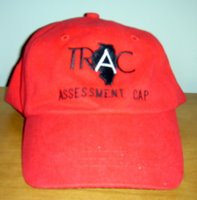Judy's Cap
 In the ten years that I have served in the Legislature, no issue has generated the grassroots activism (and anger) in my district as has our skyrocketing residential property taxes. And if she plays this the right way, Judy Barr Topinka can get some good mileage out of this in Cook County:
In the ten years that I have served in the Legislature, no issue has generated the grassroots activism (and anger) in my district as has our skyrocketing residential property taxes. And if she plays this the right way, Judy Barr Topinka can get some good mileage out of this in Cook County:ARLINGTON HEIGHTS, ILL. (AP) -- Republican candidate for governor Judy Baar Topinka says she's confident lawmakers would approve the Chicago casino that's a key component of her proposed budget plan.Topinka was in the Chicago suburb of Arlington Heights Thursday to promote the proposal, which includes a two-year cap on property taxes.
Under Topinka's plan, the education portion of a homeowner's property tax bill would be frozen and the money to school districts replaced by the increased money she says her budget proposal would generate.
Topinka's plan also calls for increasing gaming positions at the state's riverboat casinos.
Topinka says her plan would provide more than $2.4 billion of property tax relief statewide.
About one-half of our property taxes goes to the schools, so even freezing just this portion would have a noticable impact. But I still have questions about how this would work in relation to Cook County's triennial assessment pattern.
I have repeatedly stated that I am not enamored of the thought of putting a casino in Chicago. And there's no question that this doesn't solve the issue of how we assess property, nor does it resolve the decades-old school funding debate. But I think that dangling the prospect of keeping property taxes in check, even for a short period of time, is a smart political move that will resonate with voters.
I would like nothing more than for the Governor's office to stake out some bold ground on this issue. As he lives in one of the neighborhoods in my district where the current property tax revolt started, he has to be keenly aware of the problem and how important an issue it is to local residents.
If nothing else, maybe Judy's focusing on the subject will help force the related issues further to the forefront where they belong.On a related note, you can check out this AP article today about the candidates' views on school funding and consolidation.

2 Comments:
My thanks to Rich for acknowledging my resurfacing :)
There is great concern how the 7% Expanded Homeowner Exemption law affects businesses. Business leaders should think long and hard before making this an “us” (business) vs. “them” (homeowner) battle.
If assessments increase by 40-90%, as reflected in the 2006 triennial, and the current 7% protection is lost - homeowners will need to come up with major amounts of additional cash to meet next year’s tax bill. What will this mean to local business?
Homeowners do not have separate sources of income for taxes and discretionary spending. If additional funds are needed to pay taxes next year, homeowners will cut back on their spending. This means fewer visits to local restaurants, movie theaters, or nights out at the bar, the club or the bowling alley.
More money going to property taxes means less money for shoes, eyewear, or that special birthday gift – and certainly less money for home repairs, improvements, new windows or a multitude of other services provided by local business communities.
This is not only a homeowner problem. Apartment renters in smaller buildings may be faced with increased rents to cover higher taxes for their landlords – and they, too, will need to cut back on spending!
Local Chambers of Commerce should be extremely worried if the vote is not called on the 7% Expanded Homeowner Exemption during the November veto session. Think of the tens of thousands of residents in your community who will have less money to spend locally!
Post a Comment
<< Home